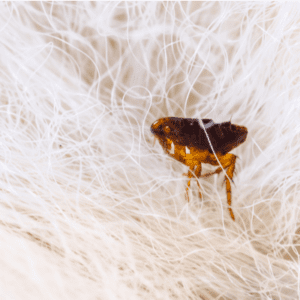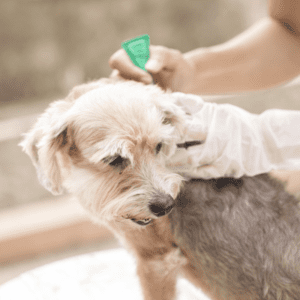Are Fleas Still Active During The Winter?
Baby, it’s cold outside! It’s January here in PA, and that means frost on our windshields, dry, chapped hands, and possibly even snow in our driveways. One thing we don’t think of this time of year is those irritating fleas. But perhaps we should. Some of those pesky critters may have found their way into your home through the fur of your cuddly best friend. Fleas prefer the warm temperatures, and once inside, the warmth of your home provides them a cozy place to live, survive, and breed.
Fleas multiply very quickly. The female flea will drop from the host and immediately lay between 40 – 50 eggs per day. They can lay eggs in your carpet, beds, sofas, and various areas of your house where your pet spends most of their time. After the eggs hatch, they feed on digested blood left behind by adult fleas. In about one or two weeks, the larvae spin a cocoon. This cocoon can last up to a year, waiting for the ideal environment in which to thrive.

Why Are Fleas Such a Bother?
Flea infestations can cause your pet discomfort, scratching, and infections. They can also be harmful to humans.
Tapeworms
These nasty creatures make themselves at home in the intestines of dogs, cats, and humans. Pets obtain tapeworms by swallowing infected fleas. Though it is rare, toddlers may become infected by eating an infected flea as well. Thankfully, the tapeworm is treated with medication.
Mycoplasma haemofelis
Mycoplasma haemofelis is a parasitic, bacterial disease that is transmitted from fleas to cats. It has been found in rare cases in humans with compromised immune systems. Treatment typically includes the use of antibiotics.
Murine Typhus
Murine typhus is rare, but if there is anything we have learned in 2020, it’s that things we never thought possible could occur. Rats are the leading carrier of this disease, but cats can also come in contact with infected fleas and carry them onto humans. Humans then get infected through flea bites. Symptoms include headache, fever, nausea, body aches, and a rash on arms and legs. Treatment includes antibiotics, but it’s crucial to catch right away as a delay in treatment can lead to a more serious illness.
How Can You Prevent a Flea Infestation?
If you are a pet owner, you can take the necessary steps to protect your home from these unpleasant creatures and minimize your risk of infection. While we highly recommend calling in professionals for flea control, there are a few ways in which you can help to prevent an infestation. They are:
- Clean and vacuum the area(s) where your pet spends most of its time including, where it eats, periods of sleep, and hangs out
- Wash everything your pet uses, sleeps, and rests on. This includes beds, blankets, sheets, and toys
- Inspect and treat your pets. Check with your veterinarian on the proper treatment for your pet. Routinely check your pet’s fur for signs of fleas to help prevent future infestations
The good news is that over the winter months, the flea’s development process is slowed, making them less active and easier to eliminate.

Protect Your Home Year-Round
At Showcase Lawn Works, we take proactive measures to ensure fleas are never a problem for you. We offer a highly effective barrier spray that kills fleas and ticks on contact. Call 717-354-3226 or contact us online to learn more. For more tips and ideas, check out our other blog postings. On social media? Like us on Facebook and get all our latest deals and other info.